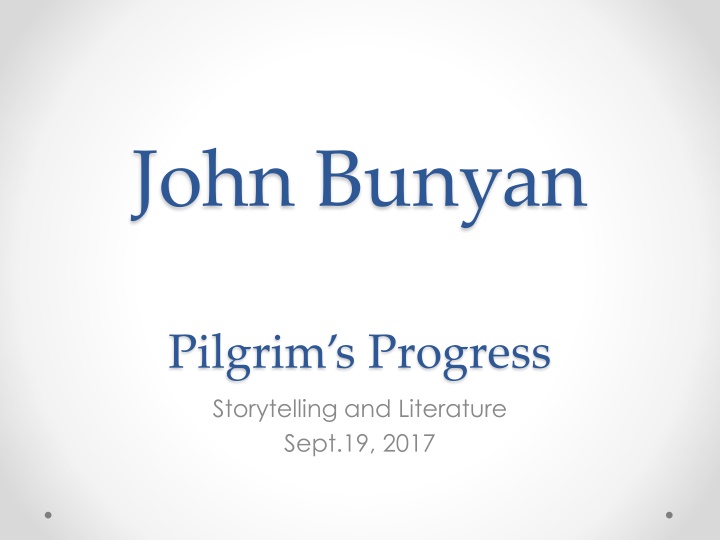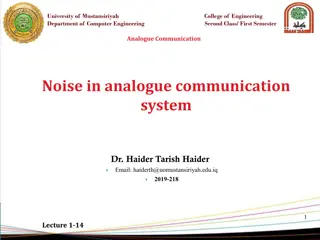
John Bunyan's Pilgrim's Progress: A Puritan Allegory of Redemption and Faith
"Explore the allegorical journey of Christian in John Bunyan's iconic work, 'The Pilgrim's Progress,' portraying the path from sin to redemption amidst hardships and faith. Discover the profound themes of Puritanism and the Christian life depicted in this timeless literary masterpiece."
Download Presentation

Please find below an Image/Link to download the presentation.
The content on the website is provided AS IS for your information and personal use only. It may not be sold, licensed, or shared on other websites without obtaining consent from the author. If you encounter any issues during the download, it is possible that the publisher has removed the file from their server.
You are allowed to download the files provided on this website for personal or commercial use, subject to the condition that they are used lawfully. All files are the property of their respective owners.
The content on the website is provided AS IS for your information and personal use only. It may not be sold, licensed, or shared on other websites without obtaining consent from the author.
E N D
Presentation Transcript
John Bunyan Pilgrim s Progress Storytelling and Literature Sept.19, 2017
John Bunyan(1628-1688) A Nonconforminst preacher not with ordination but with call Imprisonment for 12 years for refusing to promise giving up preaching from 1661. Second Imprisonment due to the Test Act in 1675 during which The Pilgrim s Progress was written.
The Pilgrims Progress The most popular allegory in English Life as a journey, simple and familiar metaphor for common people A tale of adventure full of challenges to the pilgrims firmly based on human experience
A Story of Christian Allegory An allegorical story of the path from sin to redemption centering around the character of Christian, a confused and perplexed sinner in the beginning, who gradually realises that he must leave his home and family in order to save himself.
Puritanism in Pilgrims Progress God s grace is sufficient to enable the Christian to remain faithful during the arduous pilgrimage from life to death. the goal of Christian life is the heavenly city, and life here and now is only a preparation to it. the Bible is the main guide for the journey. true religion consists in deed rather than in word.
Christian, the Protagonist his life story consists of hardships, sufferings, and struggles to overcome obstacles physical, human, and emotional that beset his path. On his long journey, Christian finds that human beings he meets offer distractions and hindrance, even bodily harm and violence. In many times of peril, Christian is fortunate in having companions who can assist him such as Evangelist, Help, Faithful, and Hopeful.
A Puritan Allegory Bunyan wants to present a puritan allegory preferring the literal sense against the Catholic s allegory of priestly symbolism Bunyan insisted that the plain sense of the Bible was clear and available to anyone who could read, writing for the people in the vernacular, not Latin. Bunyan presents himself as an individual in direct contact with God s words following an aesthetic of plainness with a democratic motive.
Bunyans Calvinism The soul can achieve salvation through no merely human righteousness, only through the imputed righteousness of Christ displayed in his incarnate life and sacrifice because of no individual merits but by free grace in election. A merely inevitable progress of the chosen believers to the Kingdom of Heaven? NO. Because of the dramatic excitement of the struggle with evil happening in the inner life of Christian. We look through his eyes and share his uncertainty though with no uncertainty in the divine purpose in the long run.






















